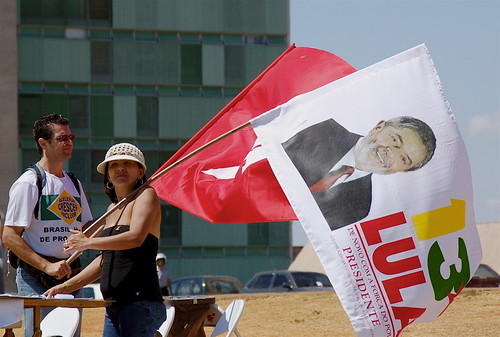
Introduction and translation by Felipe Stuart Cournoyer

Introduction and translation by Felipe Stuart Cournoyer

por Farooq Tariq, porta voz do Labour Party Pakistan, tradução: Mariana Riscali
“Vamos negociar com a ISI [Agencia de Inteligência Paquistanesa] e os Militares paquistaneses e vamos recrutar estes mujahideen. Aqui há um debate muito forte que é… não foi um mau negócio acabar com a União Soviética, mas sejamos cuidadosos com o que nós semeamos, porque iremos colher depois.” -- Hillary Clinton (23 de Abril de 2009)
Mais uma vez o Paquistão tornou-se foco de atenção mundial. Todos os dias há notícias sobre o último ataque suicida ou sobre operações militares, com mortos, feridos e comunidades desalojadas. Recentemente escolas foram ordenadas a fecharem suas portas por mais de uma semana. Até mesmo crianças falam sobre mortes e ataques suicidas.

By Marc Bonhomme, translated by Richard Fidler
A Québécois militant, member of Québec solidaire, discusses the global implications of the strike by 3500 workers at Vale Inco, the world’s largest nickel mine, in Sudbury, Ontario.
November 11, 2009 -- Socialist Voice -- In France’s South Pacific colony of New Caledonia [Kanaky], a small delegation of Vale Inco strikers from Sudbury, in northeastern Ontario, most of them Franco-Ontarians, met in October with the union at the island’s Vale Inco nickel mine, due to open in 2010, although it threatens a UNESCO nature reserve. The newspaper Nouvelles calédoniennes reported the encounter, in its October 31 edition:

By Valter Pomar, secretary of international relations, Workers’ Party (PT) of Brazil
October 10, 2009 -- It has become commonplace to say that there are two lefts in Latin America: one would be “carnivore”, the other “vegetarian”; one would be radical, the other moderate; one would be revolutionary, the other reformist; one would be socialist, the other capitalist.
Dichotomous definitions of this kind are made by spokespersons (official or unofficial) of the US State Department, with the explicit purpose of bringing about discord in the Latin American left, making it fight itself rather than its common enemies.

By Barry Healy
July 14, 2009 -- This year marks the centennial of the birth and the tenth anniversary of the death of one of the most significant religious figures of the 20th century, an instigator of the liberation theology trend in Latin American Catholicism and a campaigner against military dictatorship: Dom Hélder Camara.
Dom Hélder could have advanced himself to the position of cardinal and from there, who knows, possibly to the papacy itself. Instead, he stood for democracy in Brazil, despite threats to his life and certainly at the expense of his career. He represented the most extreme point that the Catholic hierarchy could go in standing with the poor in the tumultuous era following the Cuban Revolution and the Second Vatican Council (Vatican II).
Remembering Dom Hélder Camara is poignant in these times when the Vatican bureaucracy is headed by Benedict XVI, who, as Cardinal Ratzinger, oppressed the Latin American church precisely because of its identity with the poor.

By Luis Bilbao, translated by Gonzalo Villanueva for Links International Journal of Socialist Renewal.
By Marc Becker
February 5, 2009 -- After an absence of four years, the World Social Forum (WSF) returned to Brazil during the last week of January 2009. More than 100,000 people descended on the city of Belem at the mouth of the mighty Amazon River to debate proposals and plan strategies for making a new and better world.
The forum first met in the southern Brazilian city of Porto Alegre in 2001 as a gathering of social movements dedicated to fighting neoliberalism and militarism. Nine years later, Latin America has shifted significantly to the left, and the forum has played an important role in that process.
The forum began on January 27, 2009, as all of the forums have, with a massive march through the streets of Belem. The theme of the march was from Africa, where the last unified forum was held in Nairobi, Kenya, in
2007, to the Amazon. A drenching tropical rain momentarily stalled the planned events. The march concluded with a massive rally featuring speeches and music.
Joao Pedro Stedile addresses the January 24, 2009, national meeting of Brazil's Landless Workers' Movement, marking the MST's 25th anniversary. Stedile is co-founder of the MST. Below the videos Michael Fox reports on the MST's ``new phase'' in the agrarian reform struggle, against Brazil's mainly US-owned agro-industry.
Debemos aprender las lecciones del siglo XX para aplicarlas al comienzo del siglo XXI
Eric Toussaint
[Click HERE for the English translation]